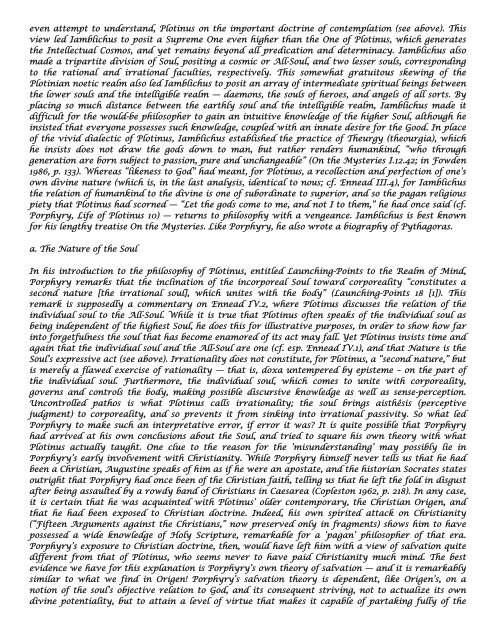Neo-Platonism - Grand Lodge Bet-El
Neo-Platonism - Grand Lodge Bet-El
Neo-Platonism - Grand Lodge Bet-El
Create successful ePaper yourself
Turn your PDF publications into a flip-book with our unique Google optimized e-Paper software.
even attempt to understand, Plotinus on the important doctrine of contemplation (see above). This<br />
view led Iamblichus to posit a Supreme One even higher than the One of Plotinus, which generates<br />
the Intellectual Cosmos, and yet remains beyond all predication and determinacy. Iamblichus also<br />
made a tripartite division of Soul, positing a cosmic or All-Soul, and two lesser souls, corresponding<br />
to the rational and irrational faculties, respectively. This somewhat gratuitous skewing of the<br />
Plotinian noetic realm also led Iamblichus to posit an array of intermediate spiritual beings between<br />
the lower souls and the intelligible realm — daemons, the souls of heroes, and angels of all sorts. By<br />
placing so much distance between the earthly soul and the intelligible realm, Iamblichus made it<br />
difficult for the would-be philosopher to gain an intuitive knowledge of the higher Soul, although he<br />
insisted that everyone possesses such knowledge, coupled with an innate desire for the Good. In place<br />
of the vivid dialectic of Plotinus, Iamblichus established the practice of Theurgy (theourgia), which<br />
he insists does not draw the gods down to man, but rather renders humankind, “who through<br />
generation are born subject to passion, pure and unchangeable” (On the Mysteries I.12.42; in Fowden<br />
1986, p. 133). Whereas “likeness to God” had meant, for Plotinus, a recollection and perfection of one’s<br />
own divine nature (which is, in the last analysis, identical to nous; cf. Ennead III.4), for Iamblichus<br />
the relation of humankind to the divine is one of subordinate to superior, and so the pagan religious<br />
piety that Plotinus had scorned — “Let the gods come to me, and not I to them,” he had once said (cf.<br />
Porphyry, Life of Plotinus 10) — returns to philosophy with a vengeance. Iamblichus is best known<br />
for his lengthy treatise On the Mysteries. Like Porphyry, he also wrote a biography of Pythagoras.<br />
a. The Nature of the Soul<br />
In his introduction to the philosophy of Plotinus, entitled Launching-Points to the Realm of Mind,<br />
Porphyry remarks that the inclination of the incorporeal Soul toward corporeality “constitutes a<br />
second nature [the irrational soul], which unites with the body” (Launching-Points 18 [1]). This<br />
remark is supposedly a commentary on Ennead IV.2, where Plotinus discusses the relation of the<br />
individual soul to the All-Soul. While it is true that Plotinus often speaks of the individual soul as<br />
being independent of the highest Soul, he does this for illustrative purposes, in order to show how far<br />
into forgetfulness the soul that has become enamored of its act may fall. Yet Plotinus insists time and<br />
again that the individual soul and the All-Soul are one (cf. esp. Ennead IV.1), and that Nature is the<br />
Soul’s expressive act (see above). Irrationality does not constitute, for Plotinus, a “second nature,” but<br />
is merely a flawed exercise of rationality — that is, doxa untempered by episteme – on the part of<br />
the individual soul. Furthermore, the individual soul, which comes to unite with corporeality,<br />
governs and controls the body, making possible discursive knowledge as well as sense-perception.<br />
Uncontrolled pathos is what Plotinus calls irrationality; the soul brings aisthêsis (perceptive<br />
judgment) to corporeality, and so prevents it from sinking into irrational passivity. So what led<br />
Porphyry to make such an interpretative error, if error it was? It is quite possible that Porphyry<br />
had arrived at his own conclusions about the Soul, and tried to square his own theory with what<br />
Plotinus actually taught. One clue to the reason for the ‘misunderstanding’ may possibly lie in<br />
Porphyry’s early involvement with Christianity. While Porphyry himself never tells us that he had<br />
been a Christian, Augustine speaks of him as if he were an apostate, and the historian Socrates states<br />
outright that Porphyry had once been of the Christian faith, telling us that he left the fold in disgust<br />
after being assaulted by a rowdy band of Christians in Caesarea (Copleston 1962, p. 218). In any case,<br />
it is certain that he was acquainted with Plotinus’ older contemporary, the Christian Origen, and<br />
that he had been exposed to Christian doctrine. Indeed, his own spirited attack on Christianity<br />
(“Fifteen Arguments against the Christians,” now preserved only in fragments) shows him to have<br />
possessed a wide knowledge of Holy Scripture, remarkable for a ‘pagan’ philosopher of that era.<br />
Porphyry’s exposure to Christian doctrine, then, would have left him with a view of salvation quite<br />
different from that of Plotinus, who seems never to have paid Christianity much mind. The best<br />
evidence we have for this explanation is Porphyry’s own theory of salvation — and it is remarkably<br />
similar to what we find in Origen! Porphyry’s salvation theory is dependent, like Origen’s, on a<br />
notion of the soul’s objective relation to God, and its consequent striving, not to actualize its own<br />
divine potentiality, but to attain a level of virtue that makes it capable of partaking fully of the
















